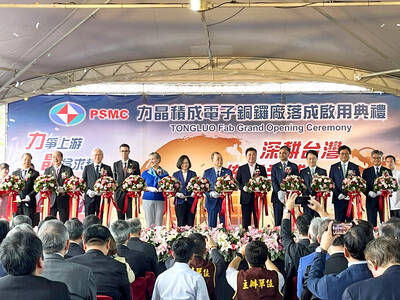Walt Disney Co on Sunday ousted Bob Chapek as chief executive and announced that it had brought back former CEO Bob Iger to once again take the reins.
The change, a dramatic turn of events for one of the largest media conglomerates in the world, was effective immediately, Disney said in a statement.
“We thank Bob Chapek for his service to Disney over his long career,” said Susan Arnold, chair of Disney’s board.

Photo: Reuters
The board of directors said that as the company “embarks on an increasingly complex period of industry transformation, Bob Iger is uniquely situated to lead.”
Chapek spent two years as CEO, a period that saw Wall Street concerned about rising expenses at the company. Disney’s stock has fallen 41 percent this year.
Iger, who previously served as Disney’s CEO for 15 years, increasing the company’s market capitalization five-fold during that period, has pledged to return as CEO for at least two years, the statement said.
Iger, now 71, had promoted Chapek as his replacement in 2020, but the relationship soured and by early this year, the two rarely spoke.
“I am deeply honored to be asked to again lead this remarkable team ... through unrivaled, bold storytelling,” Iger said.
Under Iger’s leadership, Disney acquired Pixar Animation Studios, Marvel Entertainment LLC, Lucasfilm Ltd and 21st Century Fox Inc. It also opened its first theme park in China — the Shanghai Disney Resort — and launched the Disney+ and ESPN+ streaming services.
Chapek upset many of Disney’s 200,000 employees earlier this year with how he handled the “Don’t Say Gay” law in Florida, where a Disney theme park is located.
The law bars public schools from teaching learners in kindergarten through third grade about sexual orientation or gender identity.
Chapek remained silent on the issue until pressure grew among Disney’s employees.
The scandal prompted Florida to end Disney’s self-governing status in its Orlando theme park, which takes effect in June next year.
As recently as June, Disney’s board had signaled that it still supported Chapek, offering him a contract extension of three more years.
Chapek oversaw a marked increase in Disney’s total revenue to US$28.7 billion for the fiscal year, which ended on Oct. 1.
However, costs were also rising sharply and Chapek last week announced companywide cost-cutting measures and said layoffs were likely.
After dealing with major challenges caused by the COVID-19 pandemic at the company, Chapek hit speedbumps in ramping up Disney’s streaming services.
Earlier this month, he reported an increase of 12.1 million subscribers to Disney+ — bringing its global total to 164.2 million. Disney’s Hulu and ESPN+ also added 1 million and 1.5 million subscribers, respectively.
However, that news was tempered by increasing operating losses for streaming services, which nearly doubled to US$1.47 billion last quarter.
Those numbers gave some Wall Street analysts serious concerns, and the host of CNBC’s Mad Money show, Jim Cramer, last week called for Disney to sack Chapek and fix the company’s “balance sheet from hell.”

BUSINESS UPDATE: The iPhone assembler said operations outlook is expected to show quarter-on-quarter and year-on-year growth for the second quarter Hon Hai Precision Industry Co (鴻海精密) yesterday reported strong growth in sales last month, potentially raising expectations for iPhone sales while artificial intelligence (AI)-related business booms. The company, which assembles the majority of Apple Inc’s smartphones, reported a 19.03 percent rise in monthly sales to NT$510.9 billion (US$15.78 billion), from NT$429.22 billion in the same period last year. On a monthly basis, sales rose 14.16 percent, it said. The company in a statement said that last month’s revenue was a record-breaking April performance. Hon Hai, known also as Foxconn Technology Group (富士康科技集團), assembles most iPhones, but the company is diversifying its business to

ARTIFICIAL INTELLIGENCE: The chipmaker last month raised its capital spending by 28 percent for this year to NT$32 billion from a previous estimate of NT$25 billion Contract chipmaker Powerchip Semiconductor Manufacturing Corp (力積電子) yesterday launched a new 12-inch fab, tapping into advanced chip-on-wafer-on-substrate (CoWoS) packaging technology to support rising demand for artificial intelligence (AI) devices. Powerchip is to offer interposers, one of three parts in CoWoS packaging technology, with shipments scheduled for the second half of this year, Powerchip chairman Frank Huang (黃崇仁) told reporters on the sidelines of a fab inauguration ceremony in the Tongluo Science Park (銅鑼科學園區) in Miaoli County yesterday. “We are working with customers to supply CoWoS-related business, utilizing part of this new fab’s capacity,” Huang said, adding that Powerchip intended to bridge

Qualcomm Inc, the world’s biggest seller of smartphone processors, gave an upbeat forecast for sales and profit in the current period, suggesting demand for handsets is increasing after a two-year slump. Revenue in the three months ended in June will be US$8.8 billion to US$9.6 billion, the company said in a statement Wednesday. Excluding certain items, earnings will be US$2.15 to US$2.35 a share. Analysts had projected sales of US$9.08 billion and earnings of US$2.16 a share. The outlook signals that the smartphone market has begun to bounce back, tracking with Qualcomm’s forecast that demand would gradually recover this year. The San

Clambering hand-over-hand, sweat dripping into his eyes, a durian laborer expertly slices a cumbersome fruit from a tree before tossing it down to land with a soft thump in his colleague’s waiting arms about 15m below. Among Thailand’s most famous and lucrative exports, the pungent “king of fruits” is as distinctive in its smell as its spiky green-brown carapace, and has been farmed in the kingdom for hundreds of years. However, a vicious heat wave engulfing Southeast Asia has resulted in smaller yields and spiraling costs, with growers and sellers increasingly panicked as global warming damages the industry. “This year is a crisis,”